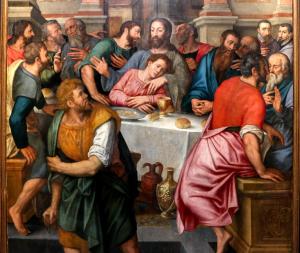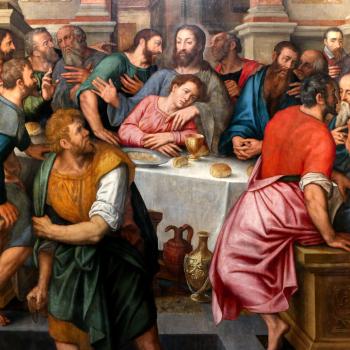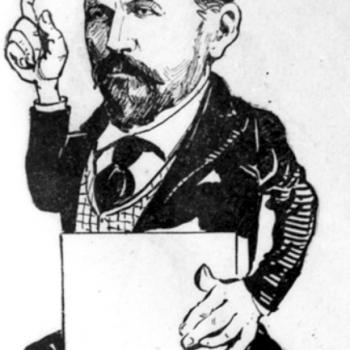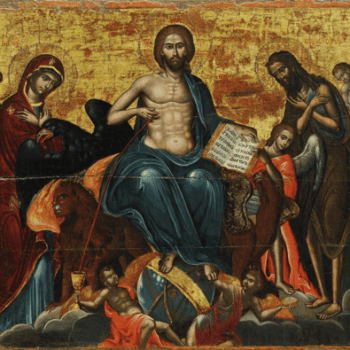
While we tend to think of Judas in hindsight, that is, as the one who betrayed Jesus, it is important to remember he was also an apostle, chosen by Jesus. Indeed, as Sergius Bulgakov reminds us in his examination of Judas, Judas even loved Jesus. We must not think of Judas merely as a villain, as someone who came to Jesus with false pretenses, with the express purpose of betraying Jesus. Bulgakov put it succinctly: despite his betrayal, Judas was one of twelve personally called by Jesus, indeed, he had been inspired by Christ and represented Christ to the people because he believed in and trusted in Jesus. He, with the other apostles, worked miracles. He was not, as some think, a greedy man who took advantage of the opportunity Christ gave him to make himself wealthy, rather, he was devoted to Christ, and he, like the rest of the apostles, came to Christ with the hope that Christ would fulfill all the messianic hopes and dreams he had. Judas’ betrayal was not for money (which is why he accepted a paltry sum to help the authorities capture Jesus); what he received was merely a token amount. Rather, as Bulgakov, and as many others have suggested, Judas hoped that he would be forcing Christ’s hand; by turning him over to the authorities, Judas thought Jesus would act and become the messianic king which Judas expected him to be:
A satanic storm blew up in Judas’ soul: all his human nature revolted against betrayal of the One Whom he loved more than himself, more than his own life, more than his soul. But this was his purpose, his vocation and his election: he must save the Friend, pulling Him out of inaction. And in the cold delight of finding inspiration, the path to his achievement continued to unfold before him. Judas felt in the grip of this rending torrent of conflicting thoughts and feelings. Yes, it will be an act of friendship, not betrayal. Can He really be betrayed, Who has power over life and death?[1]
Following this interpretation of Judas, one which can answer many questions we have concerning him, Judas did not believe he was really betraying Jesus. Indeed, Bulgakov opines, Jesus’ words to him at the Last Supper was interpreted by Judas as Jesus knowing what Judas was going to do and telling him to do so with his approval.[2] Judas believed what he was doing was for the good, not only for Christ, so that he can be glorified, but for the world. It was time for Jesus to act. He believed it was his duty to set things up to make sure Jesus had no other options left than to act. With the raising of Lazarus, Jesus proved himself as having power over life and death itself. The crowd welcomed him into Jerusalem. They, took, were ready for Jesus taking up the messianic throne. Who could stop him, once he acted? Who could prevent Jesus taking his rightful place, not just in Israel, but in the world itself?
Everything Judas sees inflames his thoughts and makes him look for more. He wants to see Him on the throne of Israel, restoring the kingdom to His nation, relieving every grief and healing every affliction and every sickness in people, and then ruling the world.[3]
We easily forget the kind of nationalism which was going on in first century Israel. Much of it developed as a response to Rome and Roman rule. They had legitimate grievances, but their responses to them was often wrong, as it indicated they merely wanted to do to others what had been done to them. Many of the zealots awaited the coming of a conquering king, one who not only would expel the Romans from Israel, but who would then help Israel expand and become the greatest power in the world. Judas, like many of Jesus’ followers, seem to have had such a vision for Jesus. And, due to the way such nationalism blinds people, causing people to see and interpret all things following its ideologies, Judas could not properly understand all that Jesus taught and revealed concerning God and God’s way with the world. Judas’s vision for what he believed Jesus should be like in order to fulfill his own expectations of the messiah, instead of Jesus’ own vision for himself, formed the basis of his friendship and loyalty to Christ, explaining, once again, why he thought he was helping Jesus instead of betraying him:
Into personal love for Him he placed all his nationalistic fanaticism, his ideal, for which he lived. He saw Him in the light of the ideal, of those revolutionary-apocalyptic aspirations, and only in that sense did he took on His work. He did not understand his Teacher, and not only was he not aware of his inability to understand, but he sincerely wanted to change His path, to correct His ideas and actions. [4]
Judas, therefore, saw himself, until the very end, as acting on Jesus’ behalf; only when Jesus did not do as Judas expected did Judas give into despair and wonder what it was he had done. It was that despair which would lead Judas not only to hate himself, but to seek the end of his own life. Despite all that Judas had done, Jesus still loved him, and if Judas had been willing to listen and learn from Jesus, to engage that element of Jesus’ message he had ignored or misunderstood, even his betrayal of Christ could have been forgiven. After all, Jesus showed he was willing to forgive and help everyone upon the cross:
But He Who sees the heart judged it, He Who had called him to apostolic service, and His judgment was such, that Judas, having handled Him over to torturers for the sake of blind zeal for Him, remained, even in that torment, an apostle. [5]
Judas is a tragic figure, and the tragedy of his life should serve as a warning to all Christians. They can love Christ, but their love can be impure, and through such impurity, they end up trying to force upon Jesus their own notions of what they think he should be doing instead of listening to Jesus and following the path which Jesus set up, the path of the cross. We should not try to trap Christ, to make him fulfill the destiny which we think he needs to fulfill in order to be the messiah. We should not try to force his hand. And, while some might think no Christian does this, that is far from the case; all of us seem to do it, in various ways, as can be seen in the way we pray. We have so much we have to unlearn, so that we can be properly transformed by Christ. But, there are some Christians who are worse than others in the way they treat Christ. Among the worst are those who want to force Jesus to come again during their own lifetime. Like Judas trying to force Jesus to act, to create the messianic kingdom, they want to force Jesus to act, and to do that, they want to bring the world to the brink of destruction, creating the conditions they think will make Jesus return. When they do this, not only do they show they have not understood Christ’s message, they betray Jesus in a way similar to, and possibly worse than, Judas (because they have Judas as an example of what they should not be like). This is not to say they are not Christians, because they are, just as much as Judas was an apostle. But, their engagement with Christ is perverted, based upon all kinds of dangerous ideologies, ideologies which run counter to all Christ stood for. Their way is anti-Christian, and in that way, while Christians, they are following the spirit of the anti-Christ. Since they betray Christ in what they do, their fellow Christians should do what they can to correct them, and if they are unwilling to be corrected, to stop them. They need to make it clear that such Christians are as wrong as Judas was, and often for the same reason. Thus, those who want to turn Christ into a worldly Lord who will use power and force, not love, to rule the world, show they are just as wayward as Judas, giving into one of Satan’s greatest temptations, the temptation to embrace earthly power to try to turn the world into their own false vision of heaven:
The most perilous temptation is not that of bread, but of power, of that coercion with which Judas wanted to define Christ after his own image. Coercion upon conscience and upon human freedom really is a diabolic matter: the devil entered into Judas, and he became a means to exercise coercion upon Christ. [6]
It is a sad truth that so many Christians have not learned the lesson of Judas. They think they are different from him even though they end up doing the same things Judas did. They are nationalists who embrace the way of power, seeking to put all people beneath their feat. They love Christ, not for who he really is, but for who they have made him out to be as interpreted by their perverted ideologies. It is, to be sure, a true love, and it can even be a kind which makes them Christian, but it is also a perverted love, leading to a perverted form of Christianity. They want to make Christ, the Christ of their vision, to come back to the world, and so, they will seek power, not just for their own glory, but for the sake of bringing the world to its end, so that he can then come back in glory as the conquering king. They are just continuing what Judas started. They believe they do so because it is for the sake of the greater good, because, like Judas, they want Jesus to fulfill his destiny. But they have not listened to Christ, they have not paid attention, they have not heeded the warning which Scripture gives concerning those who engage Jesus in this manner. When Christ does not do what they believe him should do, what then? Will they, in the end, follow Judas into despair? And if they do, and they have power, will they then just use such despair as a new excuse to seek the end of the world, not because they believe they can have Christ return to it but because they end up believing Christ won’t and so there is nothing good in the world itself? Let us hope we do not see such an answer to that question.
[1] Sergius Bulgakov, Judas Iscariot – Apostle – Betrayer. Trans. Mike Whitton (No City Listed: Independently Published, 2023), 23.
[2] See Sergius Bulgakov, Judas Iscariot – Apostle – Betrayer, 38.
[3] Sergius Bulgakov, Judas Iscariot – Apostle – Betrayer, 23.
[4] Sergius Bulgakov, Judas Iscariot – Apostle – Betrayer, 22.
[5] Sergius Bulgakov, Judas Iscariot – Apostle – Betrayer, 33.
[6] Sergius Bulgakov, Judas Iscariot – Apostle – Betrayer. 78.

















